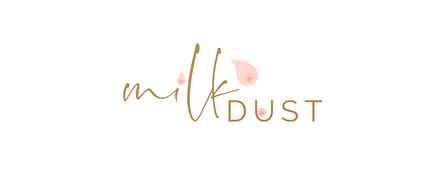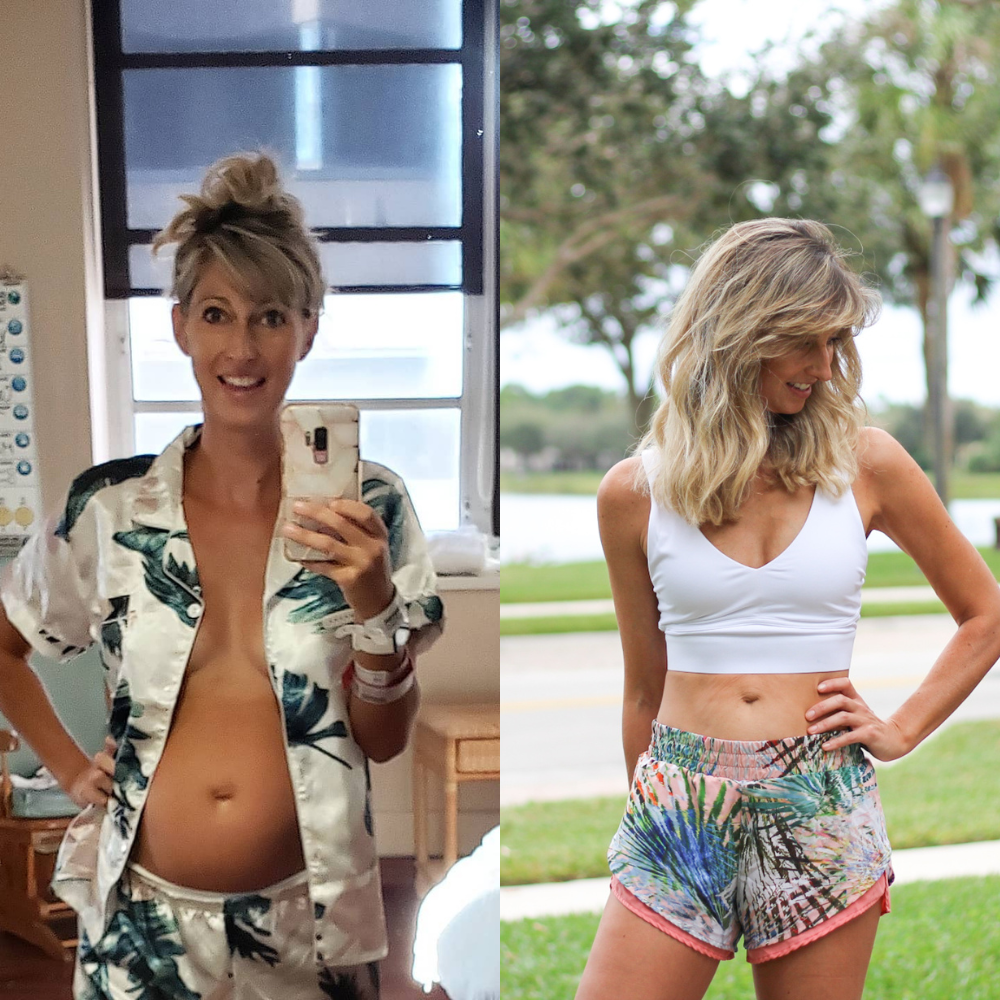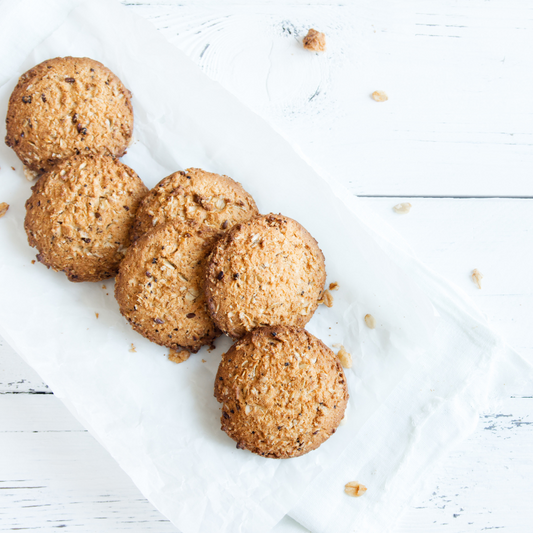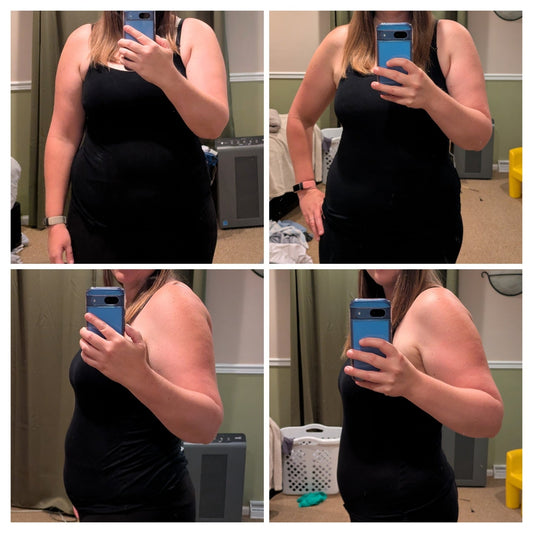Losing the baby weight after baby number 4 for me was a whole different world than my first baby. I found out I was pregnant with my fourth baby right before the world shut down for Covid. As I'm dealing with extreme fatigue and nausea, the schools shut down and my older three are all of the sudden home full time with no where to go. I was super active, running 4 miles a day, then everything went crazy. Over the hot summer months of the beginning of Covid, I gained weight fairly fast. Typically, my first trimester of pregnancy I gain the most weight because I need to eat to keep from feeling like throwing up. Add in the fact that I was 34, not 26 like my first pregnancy, and let's just say I was a little thrown. I gained an overall 25-30lbs, which doesn't sound like much weight, but for me it was.
Luckily, I had just finished formulating Bump Dust, my prenatal protein powder that is also a prenatal vitamin. I finished and had it ready by the time I hit my second trimester, and it was a game-changer for my pregnancy. I had an amazing protein shake to help me feel better, give my body a ton of nutrients, and it really helped increase my energy levels. I was able to get back on track with a workout routine, good nutrition and some strength training to start building my muscle mass back. I started clean eating challenges, and really worked hard to actually lose some of the excess weight I had gained over the first trimester. My Bump Dust shakes really helped me get on track again, get control of my pregnancy weight gain, and really find fitness again in the midst of the full pandemic.
Once my fourth baby arrived, I was so excited to get back on track and lose the baby weight. It was a bit different, and I realized that in the first weeks. This was also the first pregnancy I had Milk Dust! I created Milk Dust after my 3rd baby was born, and he was just finishing breastfeeding when I had the formula produced and ready. Now, I had my Milk Dust shakes with me in the hospital, and my milk supply came in so fast!
Everything I did to lose the baby weight again, after my fourth baby:

Many postpartum mamas look forward to losing the baby weight after pregnancy. Whether it is to get back to your pre-pregnancy weight, or just feel a little ligher, the best way to do this while breastfeeding is by focusing on nutrients, rather than calories and increasing physical activity slowly. Losing weight after pregnancy is very different than just losing weight in general because many new moms are breastfeeding. New mothers are consumed with caring for a new baby, which also makes postpartum weight loss more difficult. The extra pounds are easy to hide during pregnancy, but feel very uncomfortable after baby is born. It is completely normal to gain fat stores during pregnancy, and this is to ensure there is enough fuel stored for lactation when baby is born. But, a healthy weight postpartum is really important for your body, to prevent heart disease, postpartum depression and other medical conditions.
And yes, you can actually boost your milk supply, while still losing extra weight at the same time. Many new mommies find they have to stop their weight loss efforts until they are done breastfeeding because they worry about their milk supply. Fortunately, there are ways to boost your milk supply, and still lose the baby weight. It all comes down to your nutrition, and utilizing the correct herbs and vitamins to support lactation. Knowing which nutrients, foods and vitamins to consume can be overwhelming and confusing, so we've narrowed it down to five milk-boosting ways you can lose the weight.
Why is losing weight after pregnancy important?
Some mothers choose to accpet additional weight as a part of motherhood, but there are many negative affects that result from carrying extra weight. Similar to how extra weight gain can cause gestational diabetes during pregnancy, there can still be an onset of diabetes postpartum. Postpartum weight retention is associated with many negative effects on a mother later in life. Weight retention after the first postpartum year is associated with weight retention up to 15 years later [12]. PPWR is therefore a strong predictor of obesity in later life and also predisposes women to an increased risk of chronic diseases such as cardiovascular disease, diabetes, osteoarthritis and some cancers, according to various studies on weight gain postpartum. Studies are showing now that more care and counseling for weight management postpartum is needed to ensure the health of new mothers. Another stody by the Maternal and Child Nutrition found that a 12‐week diet intervention among postpartum women produced a weight loss of 12% after 1 year, compared to 5% in controls.
A meal plan can really help your weight loss efforts, and we have a FREE MEAL PLAN right there for you! We also have a great, 10-day sugar detox designed especially for breastfeeding mothers, and it is completely free to download.
My simple goals to set for weight loss after pregnancy that help get quick results:
Setting some simple, healthy goals for weight loss after pregnancy can actually make a big difference, without feeling too overwhelming. Here are some goals you can set now, so you don't feel tempted to start any crash diets or jump on the latest fad diet. Gradual weight loss is key to safe weight loss, but these goals can help you get to a normal weight faster than you think!
- Make two small changes each day (things like drink more water, eat only fruits and veggies as snacks, walk 5,000 steps)
- Reduce the extra calories you may have been eating while pregnant (due to cravings)
- Make healthy eating changes like switching crackers for carrots, or bread for low-carb wraps
- Begin gentle exercises and increase to light exercise as you get stronger (make sure you are cleared by your healthcare provider)
- Drink plenty of water
- Only eat healthy snacks (no candy, crackers, pizza or less-nutrient dense foods)
- Try small meals more frequently to keep your blood sugar stable
These are simple, yet powerful goals you can set now, to help you get on track to your pre-baby body. Postpartum exercise is going to be really helpful, and monitoring your milk production is important too.
Why does my breast milk supply drop when I diet?
Understanding why your milk supply may drop when starting a weight loss diet is really important. There are simple mistakes new mommies make that negatively affect milk supply, which can easily be avoided! Calorie consumption isn't actually as important as many general blogs like to tell you. Many medical professionals just relay to mommies that they need to eat "enough calories." While eating enough calories is important, eating enough nutrients is even more important. Many nurses, lactation consultants, and even doctors are not educated on nutrition during breastfeeding, so they all say the same, "eat more calories if milk supply drops."
Big mistakes breastfeeding moms make when starting a diet:
- Dropping calorie intake too fast
- Focusing on calories, rather than nutrients
- Allowing hunger to become too strong (never feeling full)
- Not combining protein and fiber for satiety
- Avoiding fruits for fear of carbohydrates
- Not eating enough protein at every snack or meal
- Eating too much sugar when hungry (which can increase estrogen)
- Working out too much (which can increase hunger levels)
Most of these mistakes are very easy to avoid if you have a good idea of what to eat. By focusing on how to eat properly, you can keep your milk supply, or increase your supply, and still lose the weight.
My 5 best tips that worked for me to lose the baby weight:

1. Find a lactation-booster that works for you:
There are so many lactation-boosters on the market now, including our Milk Dust Protein, and it is a great tool to help you keep your milk supply up. By using lactation boosters, you can encourage your body to keep producing more milk while you adjust your diet. Many of the lactation boosters have different herb blends, which is why it is a good idea to try a few. We have sample packs with 6 servings, so you can see if it works after a few uses. Our lactation blend is particularly unique because we use a combination of herbs and nutrition. There are very few lactation-boosters that use the power of nutrition, herbs and vitamins to fully support breastfeeding mamas. Our protein blend even has lactation-boosting protein from chia and flax seeds, which you won't find in many other products. Make sure to avoid the sugary, high-calorie lactation cookies and snacks. Those can add up fast, and don't promote a healthy diet. They are great for a small treat, but there are better options. Our Milk Dust Lactation Bars taste just like a sweet dessert, and only offer essential nutrient, protein and lactation herbs. They are so delicious, you will never want to eat a lactation cookie again, when you can have one of these! Other great lactation-boosters are teas and supplements. Supplements can be difficult to digest, but are a fast and easy way to get in the milk-boosting herbs, and teas are going to be easy to drink hot or cold throughout the day. No matter what lactation-booster works for you, start with this step. It is essential for establishing your milk supply before going on a diet.
2. Focus on nutrients, not calories:
In general, calories do matter, but while breastfeeding, nutrients matter more. Weight loss is an equation of energy in vs energy out, but not all energy is created equal. Your body is going to unpack and digest processed food very differently than whole fruits and veggies. Processed foods, and even low-quality proteins are going to have very little nutrients per calorie. Fruits, veggies, whole grains, beans, nuts and eggs all have a lot of nutrients per calorie. Your body is also designed to consume and digest these foods. Think of whole foods as foods your body is happy to have. It knows what to do with every part of the food, it wants to absorb all the nutrients, and everything serves a purpose. With processed foods, your body has to store the junk and work hard to take out anything that it can use. The brain is happy with the processed food because it gets glucose fast, but the rest of the "stuff" gets stored in cells as fat or eliminated in waste. Processed foods also affect the hormonal balance of the body, which can in turn affect lactation. By making every snack and meal nutrient-dense, you can ensure your body is getting the wide variety of nutrients it needs, while also eating fewer calories because most nutrient-dense foods are not calorie-dense. This will put you in a calorie deficit naturally, without even realizing it because you will feel full from all the fiber and protein. Basically a win-win for breastfeeding mamas!
3. Have protein at every meal:
Protein is essential for lactating mothers, and it is also an important macro nutrient that aids in weight loss. Ensuring that you have protein at every meal will help keep you full! Protein is also a very thermal food, meaning it takes energy to break it down. See this post for more details on the HUGE benefits of using protein for weight loss while breastfeeding. Most breastfeeding mamas crave carbs and sugar from exhaustion, stress and lack of nutrients. This can make it difficult to force yourself to eat protein-rich foods. Milk Dust is an awesome, sweet protein powder that helps curb those cravings, while providing an essential amount of protein! If smoothies aren't your thing, our bars are an amazing snack that is full of protein, yet tastes like a candy bar. Sometimes a chicken salad just doesn't sound good, and something sweet sounds way better. It's also difficult to pack protein-rich snacks on the go. String cheese, turkey or hard-boiled eggs aren't easy to keep cool and fresh. Our bars are full of protein, and super easy to eat on the go! Eating more protein will also help with energy levels when you aren't getting enough sleep. It can be tempting to eat more carbohydrates from lack of sleep, but protein is so important to help keep those carb cravings at a minimum.
4. Eat more fruit throughout the day:
So many mamas skip the benefits of whole fruit because they are trying to cut carbs. Cutting out carbohydrates that are full of nutrients can be detrimental to a successful breastfeeding diet. Fruit is full of vitamins, minerals, fiber and antioxidants that are huge benefits to milk supply. Fruit is also very filling, and a healthy way for your brain to get glucose quickly when it needs it. Many breastfeeding mamas crave sugar because their brain is tired. A tired brain loves glucose. Instead of reaching for the chocolate or ice cream, grab an apple, berries or banana. The extra fiber helps slow the glucose impact, and fill you up way more than a candy bar. The extra nutrients will support hormonal function and ensure your body can continue producing milk. We've added blueberries into our protein powder because of the powerful nutrients and antioxidants they offer. Many of our shake recipes are full of fruit because frozen and fresh fruit blend so well and make such a delicious smoothie.
5. Add in milk-boosting foods that are weight loss friendly:
There are more healthy foods you want to have in your diet weekly, so you can ensure you are encouraging your milk supply. These foods are:
- Sweet potatoes
- Oatmeal
- Eggs
- Spinach
- Pumpkin seeds
- Chia seeds
- Flax seeds
Eat some of these foods every day. Have sweet potatoes cooked and ready in the fridge, and small bags of pumpkin seeds ready for grabbing. Hard-boiled eggs are also a quick and easy grab during the day, and they offer a lot of protein, healthy fats, and other amazing nutrients like vitamin B12 (which is also in our protein powder!), which is super important to energy levels and milk supply. By adding these foods into your diet every day, you will fill up on healthier foods, making you less likely to eat all the other foods. All of the foods on the list have fiber or protein, which can help make you feel full. Eating until you feel full can really help eliminate the sugar cravings that may be difficult later. You may also like: The Meaning Behind Sugar Cravings While Breastfeeding By following these 5, milk-boosting tips, you will also help yourself lose the baby weight! Weight loss while breastfeeding can happen, and you don't have to wait until you're done breastfeeding to get back in shape. If you want even more information on nutrition and weight loss while breastfeeding, some of our other posts might be super helpful too! How A Nursing Mother Can Lose Weight Safely How To Lose Weight Naturally While Breastfeeding; No Diet or Exercise How To Lose Belly Fat While Breastfeeding How Protein Can Eliminate Belly Fat While Breastfeeding



